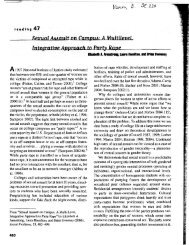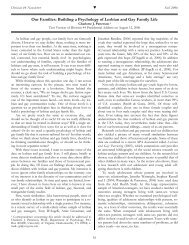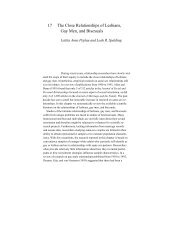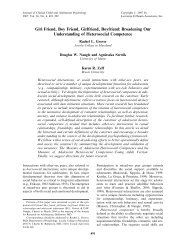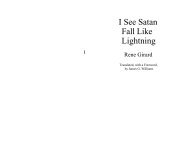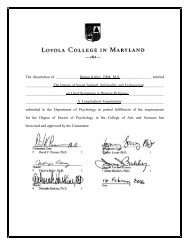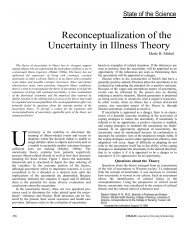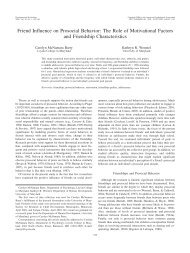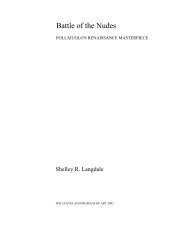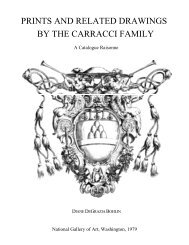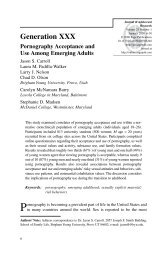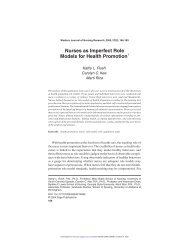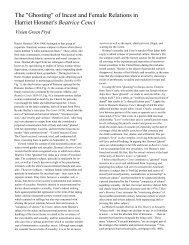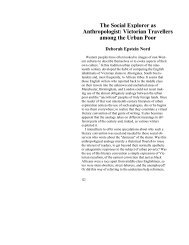You also want an ePaper? Increase the reach of your titles
YUMPU automatically turns print PDFs into web optimized ePapers that Google loves.
of troops marching to defend Engl<strong>and</strong> against the Pretender, is juxtaposed with<br />
disorder in the muddle of soldiers getting ready to leave their wives or mistresses,<br />
the foragers <strong>and</strong> deserters, the camp followers, all the idle apprentices in <strong>and</strong> out<br />
of uniform, <strong>and</strong> all the natural instincts that operate against regimentation,<br />
duty, <strong>and</strong> prudence—a confrontation that seems almost to be between art <strong>and</strong><br />
nature. In the middle foreground is another obvious version of the Choice of<br />
Hercules: a grenadier with his pretty young Protestant (English) lover, a ballad<br />
vendor, is accosted by his Jacobite wife or ex-lover, a newsvendor, wielding a<br />
"Rembrancer" (an anti-Cumberl<strong>and</strong> periodical). That the latter is Jacobite is<br />
established by the Jacobite's Journal she sells <strong>and</strong> by the cross she wears. Min-<br />
gled with love, pleasure, food <strong>and</strong> drink, sports <strong>and</strong> recreation, are their conse-<br />
quences: the dem<strong>and</strong>s of women, venereal disease, children, drunken collapse,<br />
<strong>and</strong> thievery, in the midst of which even conspiracy (two Jacobites whispering)<br />
can take place. Although Rouquet was writing for his French audience—a tick-<br />
lish matter with this print—<strong>and</strong> speaks with irony, he leaves the contrast as much<br />
in the air as <strong>Hogarth</strong> does. The orderly column of soldiers, he notices, is con-<br />
trasted with the foreground, where "la discipline est moins observee." But, he<br />
goes on, "si vous vous plaignez de ce choix, on vous dira bonnement que l'ordre,<br />
& la subordination ne convient qu'a des esclaves; car ce qui s'apelle license par<br />
tout ailleurs s'arroge ici l'auguste nom de liberte." 40 The matter is further com-<br />
plicated by the inscription <strong>Hogarth</strong> added to the engraving made from the<br />
painting: "To <strong>His</strong> MAIESTY the KING of PRUSIA <strong>and</strong> Encourager of the<br />
ARTS <strong>and</strong> SCIENCES! This Plate is most humbly Dedicated."<br />
A contemporary would have taken The March to Finchley, with its dedica-<br />
tion to the King of Prussia <strong>and</strong> its moiling confused troops, as a commentary on<br />
the Mutiny Bill being violently <strong>and</strong> spectacularly debated in Commons in<br />
1749-50, <strong>and</strong> continuing in 1751. The supporters of the Duke of Cumberl<strong>and</strong><br />
<strong>and</strong> Henry Fox, on the side of the bill, might have seen the print as depicting the<br />
current chaos of English martial discipline, as opposed to the Prussian st<strong>and</strong>ard<br />
o£ order <strong>and</strong> precision advocated by the Duke as chief of the armed forces.<br />
Horace Walpole, however, remarked of the proposed bill: "The penalty of<br />
death came over as often as the curses in the Commination on Ash-Wednesday.<br />
Oaths of secrecy were imposed on Courts Martial; <strong>and</strong> even officers on half-pay<br />
were for the future to be subject to all the jurisdiction of military law." 41 Ho-<br />
garth's basic ambiguity would allow opponents of the bill to read The March<br />
to Finchley as a comment on the frequently-heard assertion that the Duke, the<br />
incarnation of "Prussianism," treated his soldiers "rather like Germans than<br />
Englishmen." The Prince of Wales, the Duke's political enemy (<strong>and</strong> sponsor of<br />
The Rembrancer), might have read the dedication as a reference to his brother.<br />
Then again, one could take the reference to the King of Prussia as "An En-<br />
courager of <strong>Art</strong>s <strong>and</strong> Sciences!" as an ironic allusion to George II's notorious<br />
indifference to the arts. The references are there, though neither obtrusive nor<br />
87



